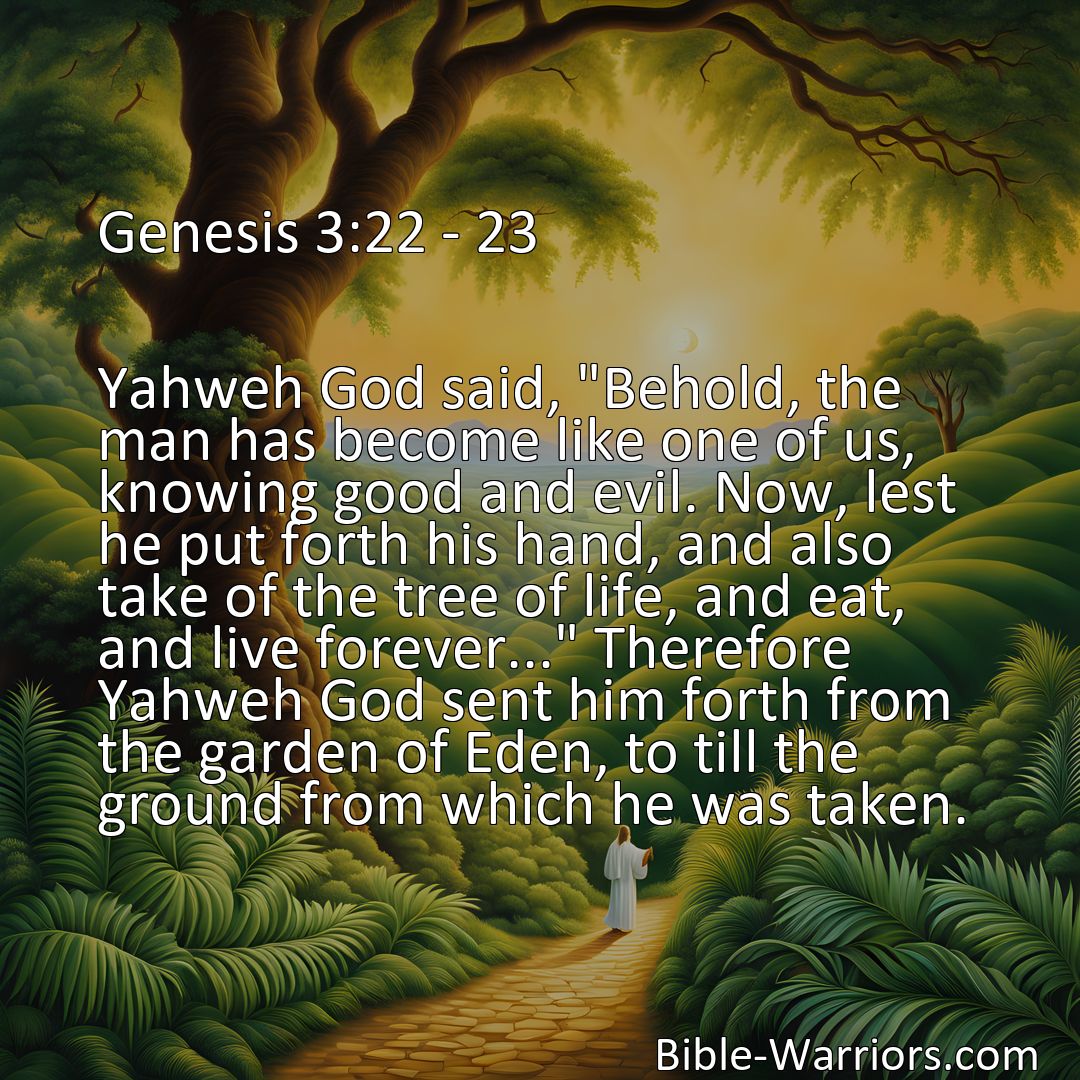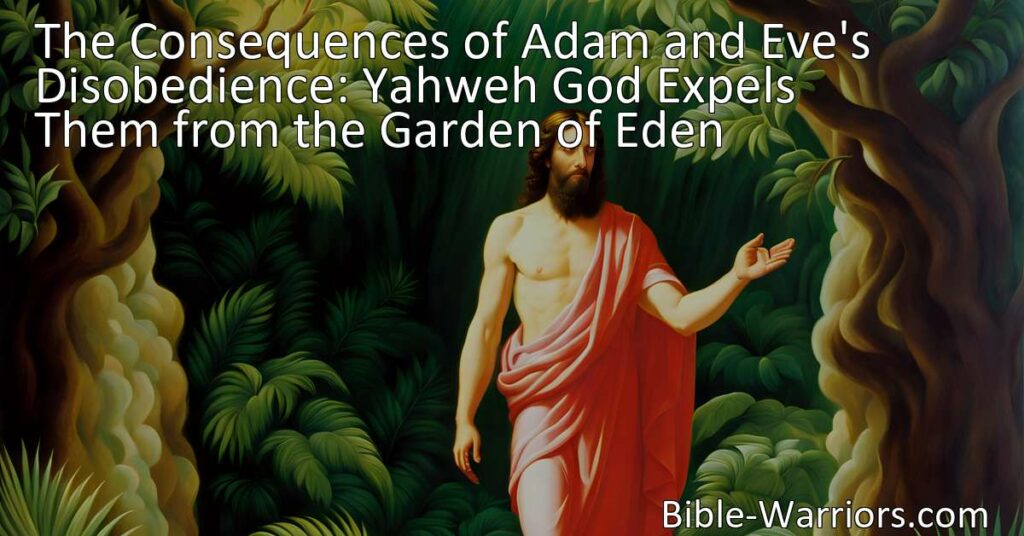Genesis 3:22 – 23 – Yahweh God said, “Behold, the man has become like one of us, knowing good and evil. Now, lest he put forth his hand, and also take of the tree of life, and eat, and live forever…” Therefore Yahweh God sent him forth from the garden of Eden, to till the ground from which he was taken.
In the story of Adam and Eve’s disobedience, Yahweh God expels them from the Garden of Eden, marking the beginning of the moral journey for humanity. Their choice to eat from the forbidden tree brings about consequences and teaches us the importance of knowing good from evil. This ancient narrative reminds us that our actions, even seemingly small ones, have lasting consequences and that we must carry the responsibility of discerning right from wrong with integrity.
Table of Contents
It’s a bit of a challenge to fully grasp the profound implications of the biblical story of Adam and Eve’s disobedience, and their subsequent expulsion from the Garden of Eden by Yahweh God. For some, it may seem like a hard-to-swallow tale, filled with seemingly out-of-date instructions and consequences. However, upon a closer look, this story reveals essential truths that still resonate with our lives today.
Yahweh God’s declaration, “Behold, the man has become like one of us, knowing good and evil” is a pivotal statement in the Bible that foreshadows the entire narrative of humanity’s struggle with morality and implications of their actions. In essence, this moment marks the commencement of mankind’s moral journey – a journey that involves knowing and choosing between good and evil.
Let’s take a step back and review Adam and Eve’s story in the Garden of Eden. Originally, they lived in an idyllic world, free from strife, hardship, pain, and even knowledge of good and evil. Their one instruction from Yahweh God was not to eat from the Tree of Knowledge of Good and Evil. We all know what happened next. Lured by the serpent’s cunning words, and the enticing allure of wisdom, they ate from the forbidden tree, effectively breaking the only rule set before them.
Yahweh God’s reaction to this disobedience is well summarized in a single, pointed verbal proclamation?”Behold, the man has become like one of us, knowing good and evil.” In that moment, Adam and Eve were transformed from innocent beings into creatures with awareness of right and wrong, tasked with the ability – and curse – to make moral judgments.
As a consequence of their actions, Yahweh God had to take a drastic step. He prevented them from eating from another tree in that sacred place?the Tree of Life, which allows eternal life to whoever consumes its fruits. They were sent forth from the garden to till the ground from which Adam was taken. This expulsion was not only a physical separation from the paradise they knew, but it also signified a spiritual distancing from their Creator.
Now, you might be wondering, why is this ancient biblical narrative relevant to our lives today? Well, it comes back to the concept of consequences, chosen actions, and the innate human capacity to discern between good and evil. Just like Adam and Eve, we partake daily from the symbolic ‘tree of knowledge of good and evil.’ We make choices, whether they be large or small, which have consequences and repercussions that could potentially last a lifetime.
Furthermore, it’s fascinating and somewhat humbling to remember that, according to this story, human beings were never intended to bear the burden of moral responsibility. Still, our willful disobedience thrust us into the complex world of decision-making and accountability. This narrative of Adam and Eve serves as a poignant reminder that every choice we’re making – whether it’s lying to a friend, taking unfair advantage, or choosing to stand for what’s right even when it’s difficult, have consequences that shape us, and the world around us.
The tale of Adam and Eve’s expulsion from the Garden of Eden can be a valuable lesson about learning from our experiences and using the awareness of good and evil as a tool for personal growth and development. Failure and mistakes, symbolized by Adam and Eve’s transgression, are not there to hold us down. Rather, they serve to guide us towards a more conscious, responsible way of living.
Inherent in Yahweh God’s declaration is both a warning and an invitation to introspection. The ability to choose between good and evil is not just a cause for despair, but it can also be viewed as a miraculous gift that sets us apart as humans. The awareness of good and evil presents us with the ability to shape our lives and destinies through our choices, to learn and grow through our mistakes, and ultimately, to make this world a better place.
The story of Adam and Eve serves as a timeless tale of human fallibility, divine justice, and the enduring power of choices and their consequences. And as we navigate our way through life, let’s remember the lesson from the Garden of Eden: our actions have consequences, and knowing good from evil is a responsibility that we must carry with integrity.
Freely Shareable Bible Verse Image Genesis 3:22 – 23
I hope this Bible verse image brings you hope and peace. Share it with someone who needs it today!



